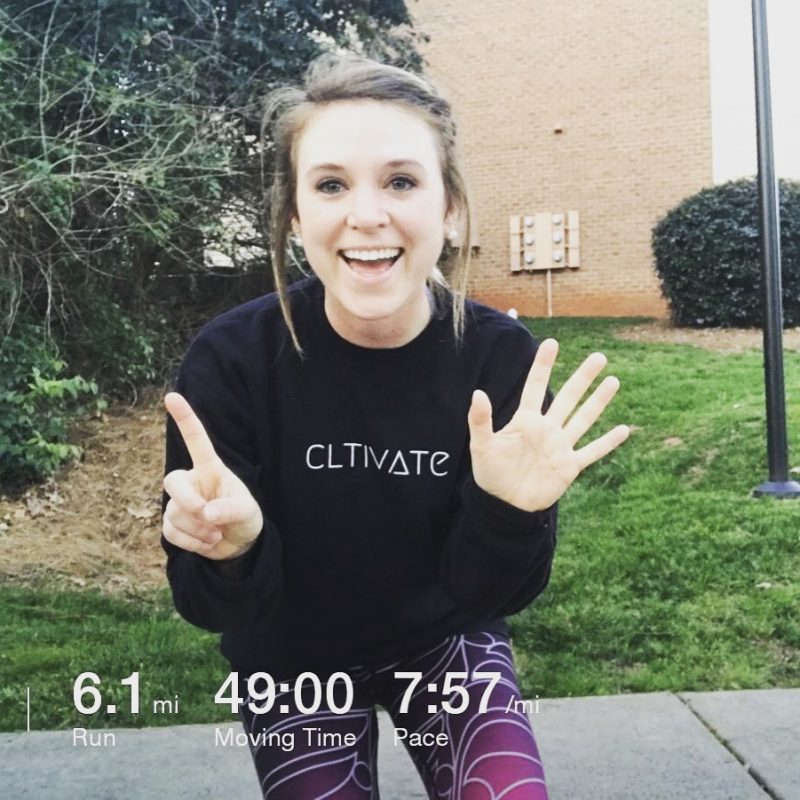But when it’s not the latter, here’s what I do to help me work through moments of heightened energy, anxiety, whatever you’d like to call it.
First, the biggest thing I’d like to note is that most people ask this question when they’re in the midst of anxiety, and when you’re there, sometimes it can be tough to come down. My biggest suggestion is to build a routine (whatever works for you, which may or may not be what’s below) and make sure you practice that routine as often as you can. I’ll get more into routines later in this post, but it’s important to keep in mind as you read through these tactics.
Also, this is what works for me. These are the tools in my toolkit. What works for you might be completely different. And I’d love to know what helps you work through anxiety. Leave your thoughts in the comments below!
(Disclaimer: I am not a doctor. These are my personal practices.)
1. Strong spiritual life

My faith and relationship with God is very important to me and has shown me my worth, which helps when feelings of doubt, fear, and insecurity creep in. Daily practices of prayer, spiritual reading, Mass, the sacraments etc. help keep me grounded and keep me going. Some books that have helped me see my worth and can surely help you are: The Bible (duh), Becoming Myself, The Other Side of Beauty, Women Food and God, Life Without ED.
We can do all things through Christ who strengthens us, and we all have moments of anxiety and sadness. Some of us feel it to an extreme. It’s important to understand what’s triggering what (is this a spiritual problem or a mental health problem)… and quite honestly, I am not the right person to turn to for that. I suggest a good Christian therapist and a strong spiritual director.
2. Writing

People swear by journaling. And I agree. Making journaling a daily practice (usually at the end of the day) helps put things into perspective. It gives you the chance to work through any struggles or anxiety and remember what you’re grateful for. One practice that I find helpful is writing my anxiety into a story. I recount what happened that led to the feelings of anxiety, talk through how I’m currently feeling, and then write what the ending will be and what I’ll learn from this bout of anxiety. It’s a good reminder that I won’t always feel this way and there there can be purpose in the pain.
3. Talk it out
![]()
Find your people and keep them close. I have a few friends and family members who I lean on when I’m having moments of anxiety. They are able to speak in a way that calms me down and helps put things into perspective, and I trust them. Coming from someone who shares her life with thousands of people, it’s very important to have a small group of trusted confidants. People you know won’t divulge anything unless you give them permission to do so. People who meet you where you are and show up for you. And you do the same for them.
4. Therapy

Thankfully, there is less and less stigma surrounding therapy these days. I don’t think I can stress how important it is to find someone who you can share everything with, who will take an unbiased approach, and who is trained in dealing with what you’re going through. There are lots of forms of therapy, so you may need to do some shopping around to find the right match (just like dating), but it’s worth the effort. I firmly believe you cannot walk this journey alone.
5. Priority List

What needs to be done now? What can wait till later? Take the time to sort out the pressing projects and focus only on what needs to be tackled right now. Having the other things on a prioritized list will help you focus on what matters in the here and now.
My therapist once said it this way: “What do you need to be perfect at now, and what can you be perfect at later.” Now, of course, we can’t reach perfection, but if we’re focused on one or two main priorities, we can put our effort into making sure those get done well and that we’re not spread thin.
6. Clear your schedule
![]()
Sometimes (and if you’re me, quite frequently) we overbook and overschedule ourselves and we end up getting run down and burnt out. One time when this happened, I was fortunate to be able to cancel all of my plans for an ENTIRE WEEK. It was glorious. But we don’t always have that luxury. The best thing to practice is “intentional yes’s.” Meaning, be selective with what and who you say ‘yes’ to. Don’t say yes to everything. And don’t make knee-jerk commitments. Think through what you’ve prioritized as important, and before you make a commitment, make sure it aligns with what you’re focusing on for the week, month, year, etc..
7. Routine

I touched on this in the introduction, but in order to make sure you’re warding off anxiety as best as you can, or prepared for when those bouts come, get yourself into a good routine. Go to bed around the same time every night, wake up early, work out, eat healthy – whatever your routine looks like for you, keep at it. A solid routine helps conserve brain power, so that when negative thoughts come in you have the energy to reframe them.
8. Healthy eating

Too much caffeine
I take breaks from caffeine as best as I can. Caffeine stays in your system for 6-7 hours after consumption and can mess with your sleep cycle, and we all know just how important sleep is for maintaining physical and mental health. If you feel like you’re in a state or approaching a state of anxiety, take a break from caffeine. You don’t need to put anything into your body that’ll stimulate more anxiety.
Too much alcohol
How many times have you had a rough week at work, only to follow it with a weekend of drinking, because you just need ‘a break’? That’s okay, you don’t have to count. Here’s the thing: Alcohol is a depressant, and for many even one drink can bring you down. When you’re in the perpetual cycle of stressed out weeks, followed by weekends of binge drinking alcohol, you’re not giving your body or mind time to heal. And your emotions are a roller coaster of feeling great in the moment, to waking up feeling down, to feeling the anxiety rev up as a new week begins. I know. I’ve been there. Do all you can to break the cycle. Staying on this roller coaster will only bring more harm until you hit a breaking point where you just can’t take it anymore. (Yeah, I’ve been there too.)
9. Medicine
![]()
Medicine is okay. But for a long time, I thought taking medicine meant failure. Some of us need it in order to help us through difficult periods of time. With proper use and guidance from a doctor, it can be effective and helpful. If you find that your anxiety is ruling your life, meaning, you cannot function, you make need to talk to your doctor about the right prescription.
I hope these help. I hope you find the peace you’re searching for. And I hope you know you’re not alone.
Love,

Want to share what helps you deal with anxiety? Comment below or send a message!
Error: Contact form not found.


